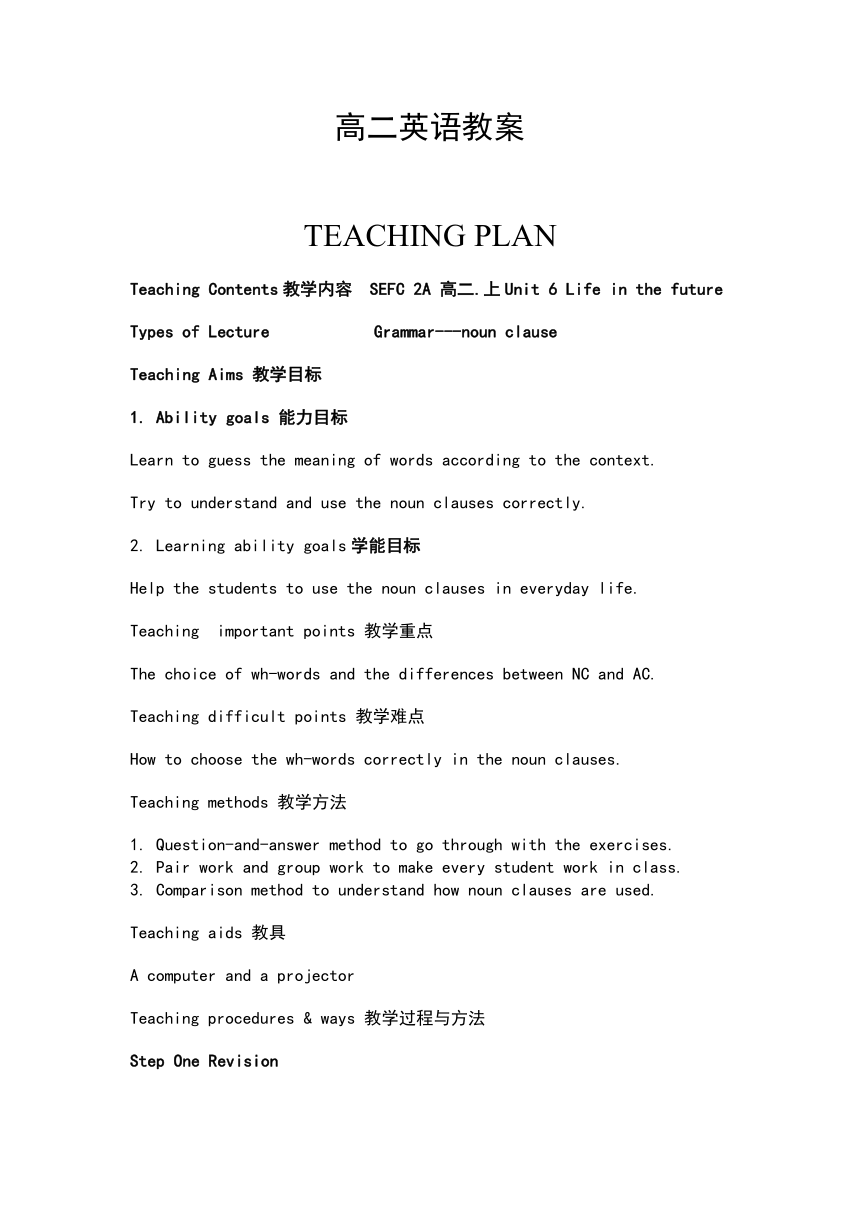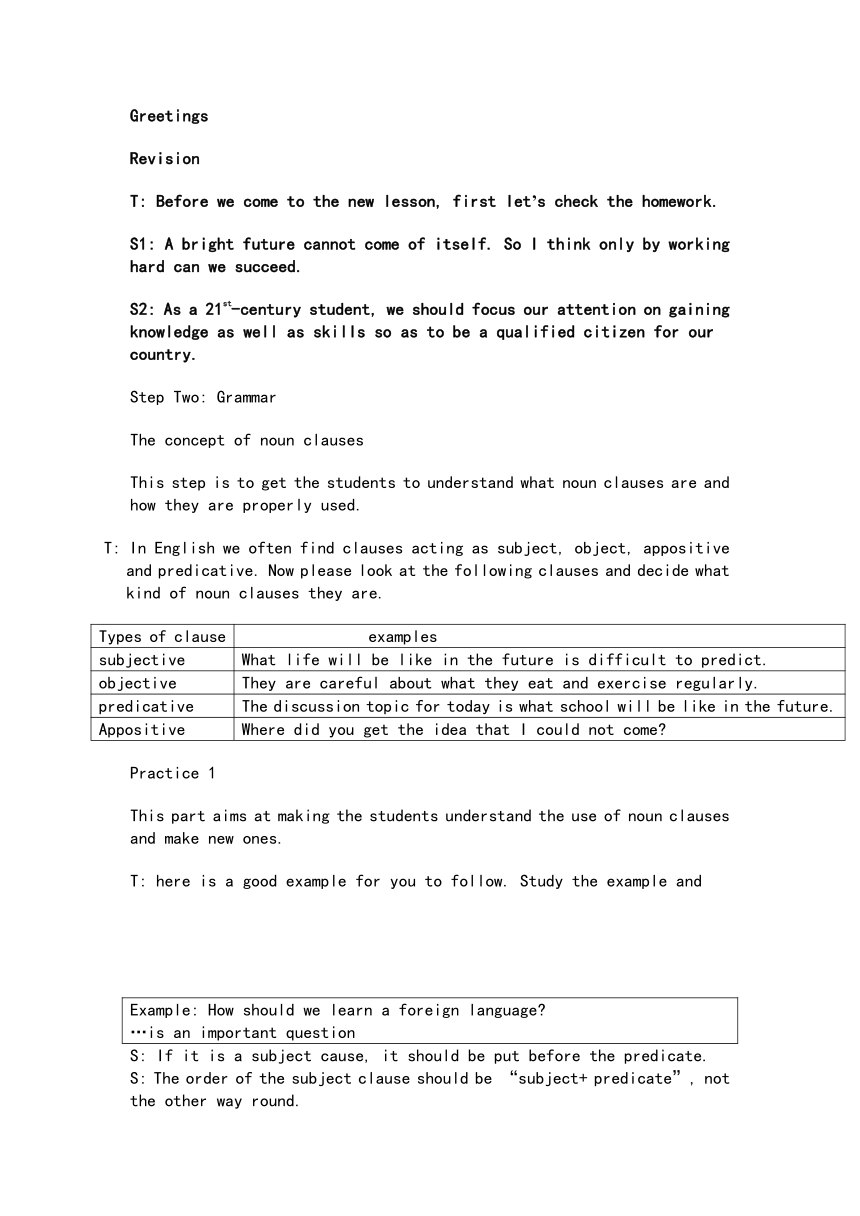Unit 6 life in the future[上学期]
文档属性
| 名称 | Unit 6 life in the future[上学期] |

|
|
| 格式 | rar | ||
| 文件大小 | 6.9KB | ||
| 资源类型 | 教案 | ||
| 版本资源 | |||
| 科目 | 英语 | ||
| 更新时间 | 2006-07-24 00:00:00 | ||
图片预览


文档简介
高二英语教案
TEACHING PLAN
Teaching Contents教学内容 SEFC 2A 高二.上Unit 6 Life in the future
Types of Lecture Grammar---noun clause
Teaching Aims 教学目标
1. Ability goals 能力目标
Learn to guess the meaning of words according to the context.
Try to understand and use the noun clauses correctly.
2. Learning ability goals学能目标
Help the students to use the noun clauses in everyday life.
Teaching important points 教学重点
The choice of wh-words and the differences between NC and AC.
Teaching difficult points 教学难点
How to choose the wh-words correctly in the noun clauses.
Teaching methods 教学方法
1. Question-and-answer method to go through with the exercises.
2. Pair work and group work to make every student work in class.
3. Comparison method to understand how noun clauses are used.
Teaching aids 教具
A computer and a projector
Teaching procedures & ways 教学过程与方法
Step One Revision
Greetings
Revision
T: Before we come to the new lesson, first let’s check the homework.
S1: A bright future cannot come of itself. So I think only by working hard can we succeed.
S2: As a 21st-century student, we should focus our attention on gaining knowledge as well as skills so as to be a qualified citizen for our country.
Step Two: Grammar
The concept of noun clauses
This step is to get the students to understand what noun clauses are and how they are properly used.
T: In English we often find clauses acting as subject, object, appositive and predicative. Now please look at the following clauses and decide what kind of noun clauses they are.
Types of clause examples
subjective What life will be like in the future is difficult to predict.
objective They are careful about what they eat and exercise regularly.
predicative The discussion topic for today is what school will be like in the future.
Appositive Where did you get the idea that I could not come
Practice 1
This part aims at making the students understand the use of noun clauses and make new ones.
T: here is a good example for you to follow. Study the example and
Example: How should we learn a foreign language …is an important question
S: If it is a subject cause, it should be put before the predicate.
S: The order of the subject clause should be “subject+ predicate”, not the other way round.
S: The conjunction of the noun clause remains unchanged.
S: The whole sentence should make sense.
T: Now can you make more sentences after the model
Practice 2
The step is to get the students to know the difference between noun clause -s and the attributive clauses.
T: Now please study the two sentences and try to tell which is a noun clause and which is an attributive clause.
He told me the news that England was beaten bySweden in the football match.2.The news that he told me was that England was beatenby Sweden in the football match
S: The first clause is a noun clause or rather an appositive clause. In this sentence, “that” is a conjunction, explaining what the news is about.
S: The second is an object clause.
S: The third is …. .
T: Well done. Help the students to analyze the sentences.
Step Three Practice ( See Workbook p118)
The step is to get the students to be familiar with noun clauses by identifying and classifying them.
Step Four Multiple choice exercises
1. They lost their way in the forest and __________ made matters worse was that night began to fall.
A. that B. this C. what D. which
2. Nobody knows __________ he mentioned that at the meeting.
A. that B. where C. why D. what
3. He tried to stand on his hands for five minutes, __________—as you know—is rather a difficult thing to do.
A. when B. where C. that D. which
4. A modern city gas been set up in _____ was a wasteland ten years ago.
A. what B. which C. what D. that
5. A story goes _____ Elizabeth I of England liked nothing more that being surrounded by clever and qualified noblemen at court.
A. when B. where C. what D. that
Step Five Sum up
1. A noun clause is a group of words that functions as a noun in a sentence.
2. A noun clause often follows one of these verbs:
Believe find out notice remember complain forget predict show pretend suppose dream learn regret
3. A noun clause often follows these adjectives:
Be afraid be clear be obvious be amazed be disappointed be sure be happy be worried
4. In conversation, an attributive clause is a group of words that describes the noun before it.
Step Six Homework
Go through the grammar once again after class, then preview the new lesson.
课后反思:名词性从句是英语语法学习的一大难关。从某种意义上说,这些从句的学习是整个英语学习过程中的瓶颈。所以,平时应加强对从句语法特征的思考,形成纯正的英语思维能力,而不能仅凭汉语思维去解决英语问题,在平日的阅读过程中,碰到从句的时候,要停下来,想一想它的功能和意义。
TEACHING PLAN
Teaching Contents教学内容 SEFC 2A 高二.上Unit 6 Life in the future
Types of Lecture Grammar---noun clause
Teaching Aims 教学目标
1. Ability goals 能力目标
Learn to guess the meaning of words according to the context.
Try to understand and use the noun clauses correctly.
2. Learning ability goals学能目标
Help the students to use the noun clauses in everyday life.
Teaching important points 教学重点
The choice of wh-words and the differences between NC and AC.
Teaching difficult points 教学难点
How to choose the wh-words correctly in the noun clauses.
Teaching methods 教学方法
1. Question-and-answer method to go through with the exercises.
2. Pair work and group work to make every student work in class.
3. Comparison method to understand how noun clauses are used.
Teaching aids 教具
A computer and a projector
Teaching procedures & ways 教学过程与方法
Step One Revision
Greetings
Revision
T: Before we come to the new lesson, first let’s check the homework.
S1: A bright future cannot come of itself. So I think only by working hard can we succeed.
S2: As a 21st-century student, we should focus our attention on gaining knowledge as well as skills so as to be a qualified citizen for our country.
Step Two: Grammar
The concept of noun clauses
This step is to get the students to understand what noun clauses are and how they are properly used.
T: In English we often find clauses acting as subject, object, appositive and predicative. Now please look at the following clauses and decide what kind of noun clauses they are.
Types of clause examples
subjective What life will be like in the future is difficult to predict.
objective They are careful about what they eat and exercise regularly.
predicative The discussion topic for today is what school will be like in the future.
Appositive Where did you get the idea that I could not come
Practice 1
This part aims at making the students understand the use of noun clauses and make new ones.
T: here is a good example for you to follow. Study the example and
Example: How should we learn a foreign language …is an important question
S: If it is a subject cause, it should be put before the predicate.
S: The order of the subject clause should be “subject+ predicate”, not the other way round.
S: The conjunction of the noun clause remains unchanged.
S: The whole sentence should make sense.
T: Now can you make more sentences after the model
Practice 2
The step is to get the students to know the difference between noun clause -s and the attributive clauses.
T: Now please study the two sentences and try to tell which is a noun clause and which is an attributive clause.
He told me the news that England was beaten bySweden in the football match.2.The news that he told me was that England was beatenby Sweden in the football match
S: The first clause is a noun clause or rather an appositive clause. In this sentence, “that” is a conjunction, explaining what the news is about.
S: The second is an object clause.
S: The third is …. .
T: Well done. Help the students to analyze the sentences.
Step Three Practice ( See Workbook p118)
The step is to get the students to be familiar with noun clauses by identifying and classifying them.
Step Four Multiple choice exercises
1. They lost their way in the forest and __________ made matters worse was that night began to fall.
A. that B. this C. what D. which
2. Nobody knows __________ he mentioned that at the meeting.
A. that B. where C. why D. what
3. He tried to stand on his hands for five minutes, __________—as you know—is rather a difficult thing to do.
A. when B. where C. that D. which
4. A modern city gas been set up in _____ was a wasteland ten years ago.
A. what B. which C. what D. that
5. A story goes _____ Elizabeth I of England liked nothing more that being surrounded by clever and qualified noblemen at court.
A. when B. where C. what D. that
Step Five Sum up
1. A noun clause is a group of words that functions as a noun in a sentence.
2. A noun clause often follows one of these verbs:
Believe find out notice remember complain forget predict show pretend suppose dream learn regret
3. A noun clause often follows these adjectives:
Be afraid be clear be obvious be amazed be disappointed be sure be happy be worried
4. In conversation, an attributive clause is a group of words that describes the noun before it.
Step Six Homework
Go through the grammar once again after class, then preview the new lesson.
课后反思:名词性从句是英语语法学习的一大难关。从某种意义上说,这些从句的学习是整个英语学习过程中的瓶颈。所以,平时应加强对从句语法特征的思考,形成纯正的英语思维能力,而不能仅凭汉语思维去解决英语问题,在平日的阅读过程中,碰到从句的时候,要停下来,想一想它的功能和意义。
